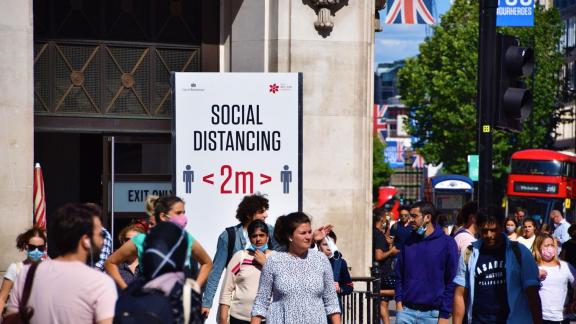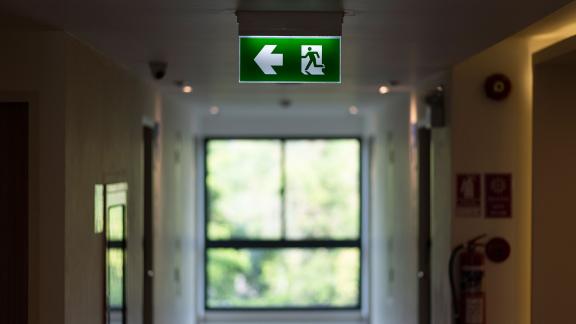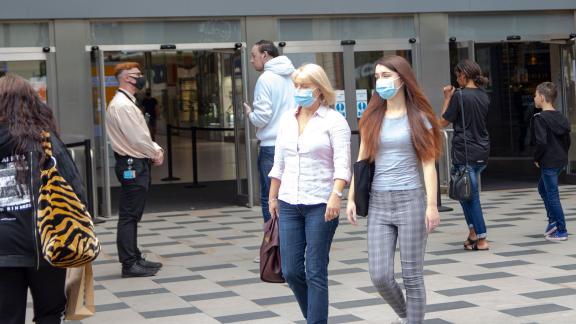NHS leaders call for delay to removing national restrictions

|
In a poll carried out by the NHS Confederation this week, 63% of health leaders in England who responded answered no to the question, “Do you think the national restrictions should be lifted on 21 June?” 30 per cent answered yes, and 6 per cent said they did not know. The government is due to confirm on Monday (14 June) whether it will proceed with easing the final set of national restrictions in England, which could see all legal limits on social contact being removed. Official figures show that daily cases of coronavirus are now at their highest since February, with a 45 per cent increase in the last week and the more transmissible Delta variant confirmed as the dominant strain in the country. Matthew Taylor, chief executive of the NHS Confederation, said: ‘Health leaders are very aware of the damaging effects that prolonged social restrictions could have on the nation’s physical health and mental wellbeing. “Yet, according to our survey the majority of NHS leaders are concerned about the risks that lifting prematurely could have on the NHS’s ability to cope at a time when staff are working so hard to recover. “There is a lot at stake, both for the NHS and our wider society so our message to the Prime Minister is simple – if there is any doubt about lifting the final restrictions on 21 June, don’t do it yet as the impact could be devastating. It would be better to take action now than regret the consequences. “We are far from the brutal peak of the pandemic that we were in at the start of the year thanks to the national lockdown, our infection control processes, and the success of our vaccination programme. But the situation is changing day by day, which is why a data-driven approach is so important. “Cases of coronavirus are rising again and many of our members have said that it would be better for more adults to be vaccinated against the disease and for more to be understood about the Delta variant before we proceed any further with the final unlock. Any increase in Covid-19 cases will disrupt hospital services – but also create extra pressure for ambulance services, community care, primary care and mental health care at a time when they are working so hard to restore services and meet high levels of non-Covid demand.” Comments from its survey of leaders from NHS trusts, primary care providers, integrated care systems and clinical commissioning groups, included: “We are now feeling the real pressure of the pandemic with exhausted staff and increased patient demand”, “The NHS needs time to recover”, "Let's be certain that we have the Delta variant under control" and “Give us a bit more time to vaccinate.” The NHS has been working hard to bring back many of its services that had been disrupted during the peaks of the pandemic, with operations and other activity confirmed to have returned to 90 per cent of pre-pandemic levels in April. However, 5.1 million people are still on the waiting list for NHS elective care (the highest since records began in 2007) and almost 400,000 people had been waiting over a year for their treatment, compared to fewer than 1,500 people at the end of 2019. Also, demand for primary care services, including significantly more complex cases, are reported to be higher than before the pandemic, while these providers continue to play a significant role in delivering the coronavirus vaccination programme. A report from the Health and Social Care Select Committee this week highlighted the impact of ‘chronic excessive workload’ on NHS staff. Over 40.8 million people have received their first dose of the vaccine and nearly 28.6 million have received their second dose. This means around 45% of the adult population is not fully protected. There are more than 1,000 people with coronavirus in English hospitals currently, the majority of whom have not been fully vaccinated and there are fears from health leaders that this could rise. The survey comes as the NHS Confederation will be convening health leaders for its three-day annual conference next week, which will focus on how the NHS can be supported to recover from the pandemic. Speakers will include Matthew Taylor, Lord Victor Adebowale (chair of the NHS Confederation), Sir Simon Stevens (chief executive of NHS England) and Secretary of State for Health and Social Care, Matt Hancock. |



